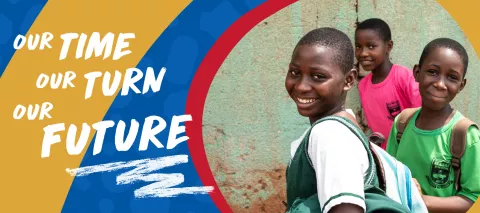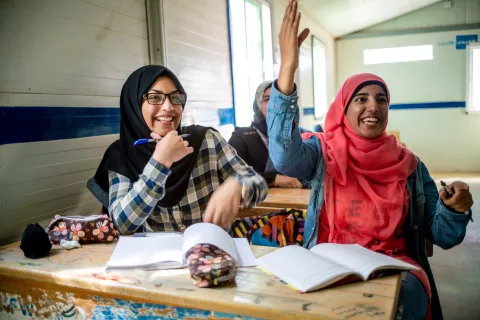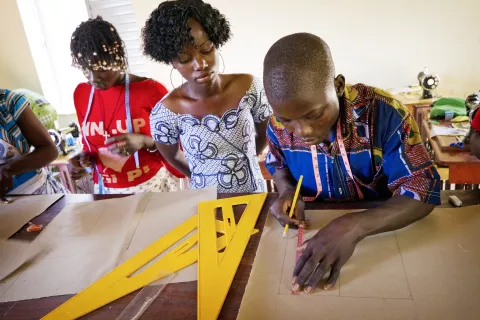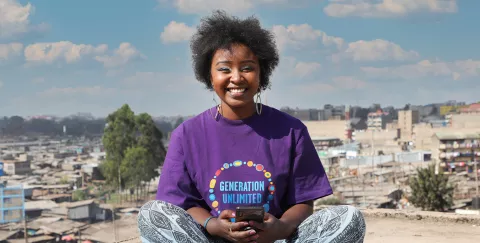Generation Unlimited Summary Annual Report 2019
2019 was a year rich in partnerships and results as Generation Unlimited finalized its strategy and started operating its business model in countries
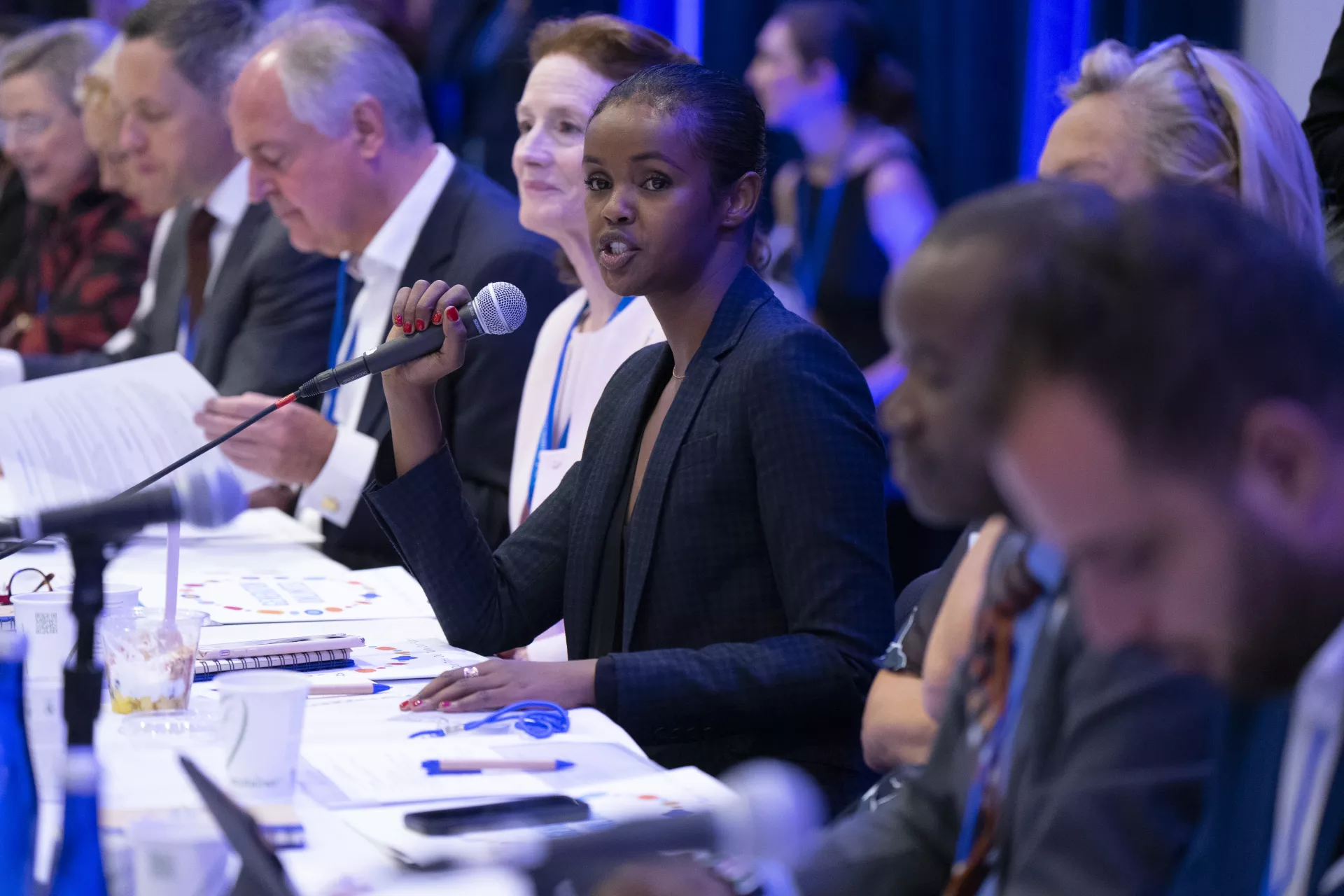
The following is a summary of the Generation Unlimited Annual Report for 2019.
To download a PDF version, click here.
Generation Unlimited: Overview and Progress 2019
Generation Unlimited is a global multisector partnership created to meet the urgent need for expanded education, skill development, employment, and engagement opportunities for young people aged 10–24.
By bridging secondary-age education and training to employment and entrepreneurship, Generation Unlimited (GenU) will support every young person to thrive in the world of work and become productive problem solvers and engaged members of society.
GenU identifies and co-creates country investment opportunities – programmes, models and innovations at a large scale – supported by public-private partnerships to attract and crowd in resources. As an accelerator for scale and for better education, skills, entrepreneurship and employment outcomes, it contributes to operationalizing the United Nations Strategy on Youth and advancing the Sustainable Development Goals.
In particular, GenU aims to modernize secondary education and training to build the skills young people need for productive lives and work, and increase and improve the number of quality work opportunities available to youth. GenU helps foster entrepreneurship as a mindset and a livelihood for young people, and engage them as problem-solvers and agents of social change.
Through public-private partnerships, GenU works with governments to attract investment at global and national levels to support country roadmaps and make effective programmes grow to accelerate results for millions of young people. GenU scales innovations by brokering shared-value partnerships with the private sector in areas such as digital connectivity, remote learning and work, entrepreneurship, portable certification, job-matching platforms, mental health and the green economy.
Following GenU’s launch at the 73rd session of the UN General Assembly in 2018, 2019 was a year rich in partnerships and results as GenU finalized its strategy and started operating its business model in countries to develop and implement Country Investment Agendas. Through a broad coalition of partners, GenU started designing portfolios of scalable, bankable initiatives and innovations that attract partnerships and investment for better education, skills, entrepreneurship and employment for millions of young people.
In Bangladesh, GenU was launched under government leadership with BRAC, International Labour Organization (ILO), UNICEF, the World Bank and private sector partners. The target is to reach at least 7.3 million young people with education, skill development and employment opportunities, and create 1 million apprenticeships by 2030. In Kenya, under leadership of President Kenyatta, GenU is designing investment opportunities for private and public partners and helping establish stronger links between employers and the education system. In India, GenU was launched under the name YuWaah to build pathways for economic opportunities for 100 million young people, facilitate 200 million young people to develop relevant skills for the future of work, and equip more than 300 million young people to become catalysts of societal change. A first portfolio of initiatives on skilling and entrepreneurship is being finalized together with government, private sector and foundations.
The partnership with the World Bank was strengthened in 2019, following the bank’s commitment of $1 billion for boosting job prospects for young people in partnership with GenU. These funds will be leveraged to scale up projects in Bangladesh, Nigeria and Tajikistan. GenU has also been partnering closely with the African Union Commission on its strategy to reach 10 million young people in Africa by 2021 in line with GenU objectives.
Overall, GenU and partners will focus on a first group of more than 20 frontrunner countries to implement the GenU operating model and scale up good programmes and projects, while inviting all countries to join this global movement to advocate for more opportunities to skill and engage young people. In addition to UNICEF, ILO has become a key GenU partner leveraging its global technical leadership in the areas of skilling, entrepreneurship and employment. ILO has expressed interest in playing a leading role on GenU in selected countries and collaborating in co-branding global knowledge initiatives. The UN Global Compact expressed interest in mobilizing business networks in countries and supporting investment fora to promote scalable solutions, and PricewaterhouseCoopers is interested in developing models for 21st century skills and entrepreneurship to support Country Investment Agendas.
In 2019, GenU started creating global knowledge products. Developed in close collaboration with ILO, Plan International, United Nations Development Programme (UNDP), UNESCO, United Nations Population Fund (UNFPA), UNICEF, the World Bank and World Organization of the Scout Movement (WOSM), the new thematic guides will support national policy reform and showcase promising approaches and policy options in areas such as upskilling, modernization of curricula and entrepreneurship.
GenU Global Breakthroughs are bold innovations that tackle challenges experienced across geographies and that GenU is committed to scale up by attracting technical and financial investment. Development of business plans started in 2019 to create and source investable opportunities, attract capital, and scale promising approaches across geographies. GenU successfully completed its first business plan on Digital Connectivity with support from Dubai Cares and worked closely on the plan’s implementation with the International Telecommunication Union (ITU). Global Breakthroughs on Remote Learning/Portable Certification, Green Economy and Job-Matching are being supported by partners, such as Microsoft, DSM and SAP, respectively.
Youth engagement is central to GenU. Eight young people are now on the GenU Board, and young leaders have been invited to join the GenU Leaders and Champions groups. The global Young People’s Action Team (YPAT) was created to act as a sounding board for the GenU Global Team as well as to support GenU development and implementation at the local level. In 2019, GenU celebrated the five winning teams of the first Generation Unlimited Youth Challenge, and a second round was launched across 41 countries as a joint initiative of UNICEF, Plan International, UNDP, and the WOSM, with support from Irish Aid, targeting over 1.5 million young people.
2019 was also a year of important engagement of the broader GenU governance, as the partnership is co-chaired by the UN Secretary-General, the President of Rwanda, and the President of Trinidad and Tobago, and includes Leaders, Champions and Board Members representing both the public and the private sector, multilateral organizations, civil society and young people. A GenU event with global private- and public-sector leaders was organized in Davos in January, and a high-level side meeting was held at the Tokyo International Conference on African Development (TICAD7) that same month to discuss GenU plans for Africa.
The establishment in 2019 of a GenU catalytic trust fund hosted by the Multi-Partner Trust Fund Office – housed within UNDP – will support GenU work and activities, especially in countries. Partners who committed financial resources to GenU so far are Dubai Cares, Irish Aid and the Government of the Netherlands, in addition to UNICEF which is currently the partnership’s hosting agency.
The work of GenU is coordinated by a Global Team based in New York that in 2019 benefitted from staff secondments from the African Union, SOS Children’s Villages International and Unilever with additional staff coming in 2020 from ING Group, International Chamber of Commerce, United Kingdom Department for International Development, and UNESCO.

